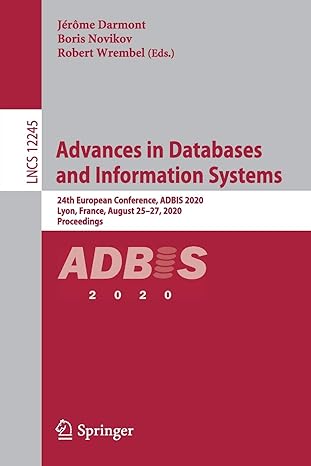Question
[c++]Having issues with errors in my program that is supposed to impletment complex numbers //complex.h #pragma once #ifndef __COMPLEX__ #define __COMPLEX__ class complex { public:
[c++]Having issues with errors in my program that is supposed to impletment complex numbers
//complex.h
#pragma once
#ifndef __COMPLEX__
#define __COMPLEX__
class complex {
public:
complex() { //dis b the default constructor
re = 0;
im = 0;
}
// the above can be written complex()=default;
complex(const double a) { //dis b the complex2double converta
double re;
double im;
}
complex(const double a, const double b) { //cart coord rep constructa
re = a;
im = b;
}
//could combine all of the above in one syntactic construct
//***copy construct begins//
complex(const complex& c) {
re = c.re;
im = c.im;
}
////can called with 0,1, or 2 parameters e.g. complex z1(4); complex z2;
//copy construct end//
//complex(const double a=0.0, const double b = 0.0) {
// re = a;
// im = b;
//}
//complex(const double a = 0.0, const double b = 0.0) : re{ a }, im{ b }
//{
//
//}
//assignment OP begin//
complex& complex::operator=(const complex& rhs) {
this->re = rhs.re;
this->im = rhs.im;
return *this;
}
//Class complex member arithmetic and additional assignment operators +=, -=, *=, /=////////////////
//
complex& complex::operator+=(const complex& rhs) {
this->re = this->re + rhs.re;
this->im = this->im + rhs.im;
return *this;
}
complex& complex::operator-=(const complex&rhs) {
this->re = this->re - rhs.re;
this->im = this->im - rhs.im;
return *this;
}
complex& complex::complex::operator*=(const complex& rhs) {
complex t;
t.re = (re*rhs.re) - (im*rhs.im);
t.im = (im * rhs.re) + (re * rhs.im);
this->re = t.re;
this->im = t.im;
return *this;
}
complex& complex::operator/=(const complex&rhs) {
complex t;
t.re = ((this->re *rhs.re) + (this->im *rhs.im)) / ((rhs.re *rhs.re) + (rhs.im * rhs.im));
t.im = ((this->im *rhs.re) + (this->re *rhs.im)) / ((rhs.re *rhs.re) + (rhs.im * rhs.im));
this->re = t.re;
this->im = t.im;
return *this;
}
//endmath//start dubs
double real() const {
return re;
}
double imag() const {
return im;
}
double magnitude() const {
return sqrt((re*re) + (im*im));
}
private:
double re;
double im;
};
complex operator+(const complex& z1, const complex & z2);
complex operator+(const complex&z1, const double x);
complex operator+(const double x, const complex&z);
complex operator-(const complex& z1, const complex & z2);
complex operator-(const complex&z1, const double x);
complex operator-(const double x, const complex&z);
complex operator*(const complex& z1, const complex & z2);
complex operator*(const complex&z1, const double x);
complex operator*(const double x, const complex&z);
complex operator/(const complex& z1, const complex & z2);
complex operator/(const complex&z1, const double x);
complex operator/(const double x, const complex&z);
complex operator+(const complex&z);
complex operator-(const complex &z);
bool operator == (const complex&z1, const complex&z2);
bool operator != (const complex &z1, const complex &z2);
ostream& operator<<(ostream&, complex&z);
istream & operator >> (istream&, complex& z);
double magnitude(const complex&z);
double real(const complex&z);
double imag(const complex&z);
complex cmplx(const double re, const double im);
complex polar(const double r, const double theta);
complex polar(const double r);
complex conj(const complex&z);
double norm(const complex&z);
double arg(const complex&z);
#endif
-------------------------------------------------------------------------
//complex.cpp
#include
#include "complex.h"
#include
using namespace std;
complex& complex::operator=(const complex& rhs) {
}
complex& complex::operator+=(const complex& rhs) {
}
complex& complex::operator-=(const complex&rhs) {
}
complex operator+(const complex& lhs, const complex& rhs)
{
complex z{ lhs };
return z += rhs;
}
inline bool operator == (const complex& z1, const complex& z2) {
return ((z1.real() == z2.real()) && (z1.imag() == z2.imag()));
}
inline bool operator != (const complex& z1, const complex& z2) {
return !(z1 == z2);
}
ostream& operator<<(ostream& out, complex& z) {
out << '(' << z.real() << ',' << z.imag() << ')';
return out;
}
istream & operator >> (istream& in, complex& z) {
in >> z.real >> z.imag;
return in;
}
double magnitude(const complex& z) {//also known as absolute value
return sqrt((z.real() * z.real()) + (z.imag() * z.imag()));
}
double real(const complex& z) {
return z.real();
}
double imag(const complex& z) {
return z.imag();
}
complex cmplx(const double real, const double imag) {
complex com;
com.real = real;
com.imag = imag;
return(com);
}
complex polar(const double r, const double theta) {
return(r*cmplx(cos(theta), sin(theta)));
}// Constructs a complex via polar coords.
complex polar(const double r) {}
complex conj(const complex& z) {
return complex{ z.real(), -z.imag() };
}// Returns the conjugate of complex number
double norm(const complex& z) {
return pow(z.magnitude(), 2);
}
// Returns squared magnitude (absolute) value of z
double arg(const complex& z){
return(z == 0 ? 0 : atan2(z.imag, z.real));
}
// Returns arg (theta) value of complex number, z. Must be calculated from internal
//representation.Undefined for z = 0.
//x=im, y=re
//
-----------------------------------------------------------------------------
//maincomponentdriver.cpp
#include
#include "complex.h"
using namespace std;
inline bool approx_value(double x, double y) {
return (y - .0001<=x) && x<=(y+.0001);
}
int main()
{
complex z1;
complex z2{ 3 };
complex z3{ 3.4,4.0 };
complex z4{ z3 };
complex z5 = z4;
complex z6(z5);
z2.operator+=(z3);
(z1 == z3);
z2 += z4;
z1 = z2 + z5;
return 0;
}
Step by Step Solution
There are 3 Steps involved in it
Step: 1

Get Instant Access to Expert-Tailored Solutions
See step-by-step solutions with expert insights and AI powered tools for academic success
Step: 2

Step: 3

Ace Your Homework with AI
Get the answers you need in no time with our AI-driven, step-by-step assistance
Get Started


